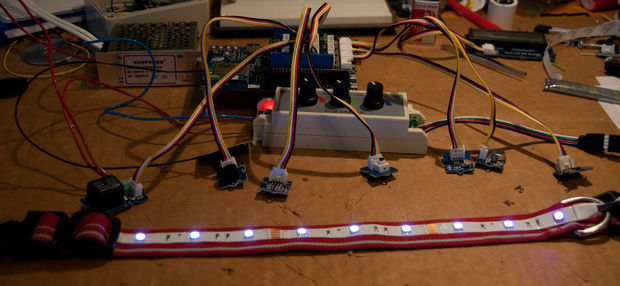A few years ago, I became a dog owner for the first time. I didn't like leaving Cody in the kennel alone all day. I had a webcam on him, but I couldn't watch it all day long. What if he was in some kind of distress? What if there was a emergency at the house, like a fire?
I wanted some way of getting an immediate email notification when he barks, or when something bad happens. So reading lead to tinkering, and tinkering eventually lead to making this full blown home automation system based on open source hardware and open source software (OpenHAB). I know I know, yet another "Home Automation" project, right? But I promise I'm not going to turn on a light from a smart phone. I'm more focused on extensive networked sensors, timely alerts, and aesthetically appealing presentation of events.
Here's the basic idea. With CY8CKIT-048 PSoC® Analog Coprocessor Pioneer Kits , it's really easy to connect boatloads of cheap sensors. Using this setup, that boatload of cheap sensors can now be on the internets. They can email you when things get too hot, too cold, too smokie, too gassy, or too bright. And your dog can email you by barking. You can also view the status of sensors on your smart phone. These sensor nodes are wireless, so you're not constrained by the location of ethernet ports.
Here's how it's put together.
This Project will be a tutorial for how to build a variety of long range wireless sensors, and how to integrate these sensors into a sophisticated open source home automation server. Aside from looking at a mobile app to see what's happening, you'll also receive timely email and audio notifications. This is a long project, but you can jump to the sensor you're interested in building.
These elements are the focus of the design:
Flexibility. based nodes allow anyone to extend the system to their particular sensing needs. You're not tied to only the examples I'm providing, even though I strive to provide many examples.
Very good reliability, up-time, and wireless sensor range.
I'm providing both a battery powered and wall-power sensor node design
So, here's the list of sensors in this project. I want to provide a home with the full range of human senses. Your home should be smart and sensitive.
Dog Bark (Any Loud Noise) Sensor
Get email notifications of loud noise. I use it to get an email if my dog barks in the kennel, so that I can open up my kennel webcam and see why he barked. There is also a counter to try to quantify how much he has been barking.
Washer-Dryer Sensor
Get an audio reminder when washer/dryer cycle completes - something like a "Washer Complete" announcement in the living room. No more forgetting laundry in the washer or wondering if it's done yet. Use the smart phone app to check if the cycle is complete or if the load has been picked up.
Light Sensor
Detect whether the light got left on or not. Displays the status of light on the smart phone app.
Area Intrusion Monitor
A PIR sensor monitors a room and sets off audio alarm / email notification when it senses a moving body.
Dog Tracker
Get notified if your dog runs away, track he's GPS location on google maps, and also map where he poops.
Gas/Fire/Smoke Sensor
Although this should not be the primary fire alarm, it can be used to send an email notification to you when the sensor senses smoke, fire, or LP gas commonly used in gas-powered stoves.
Temperature / Humidity Sensor
Temperature and humidity is reported to the mobile app. Optionally, you can enable email notifications when temperature dips below/above some preset value. Helpful for detecting furnace or air conditioner failures. You can also view a historical chart of temperature data using OpenHAB.
Water Leak Sensor
Get an email notification and audio alarm when a water leak is detected.
Security - Door / Window / Drawer / Mailbox sensor
A battery powered reed-switch sensor that can set off an audible alarm, or send an email notification to your smart phone. Can be used to monitor doors, windows, mailboxes, or drawers. It also logs the time the event happened, as well as the remaining battery capacity on the sensor.
Garage Door Monitor
This is handy if you can't see your garage door from the house. Use a smart phone to check whether your garage door is opened or closed. You can also set it to play an audio reminder at, say 10PM, if the garage door is still opened.
With these sensors, everything from your dog to your washer & dryer can be part of the Internet of Things in a practical and useful way.
If there is any other home sensing thing you'd like an example of, add a comment and I'll try to get a sensor for it or use an existing sensor to fill the need. I'm trying to make a collection of sensors for most situations. It's only in the aggregate that this system makes sense - a bunch of one-off sensors don't really create a coherent home automation project








Comments